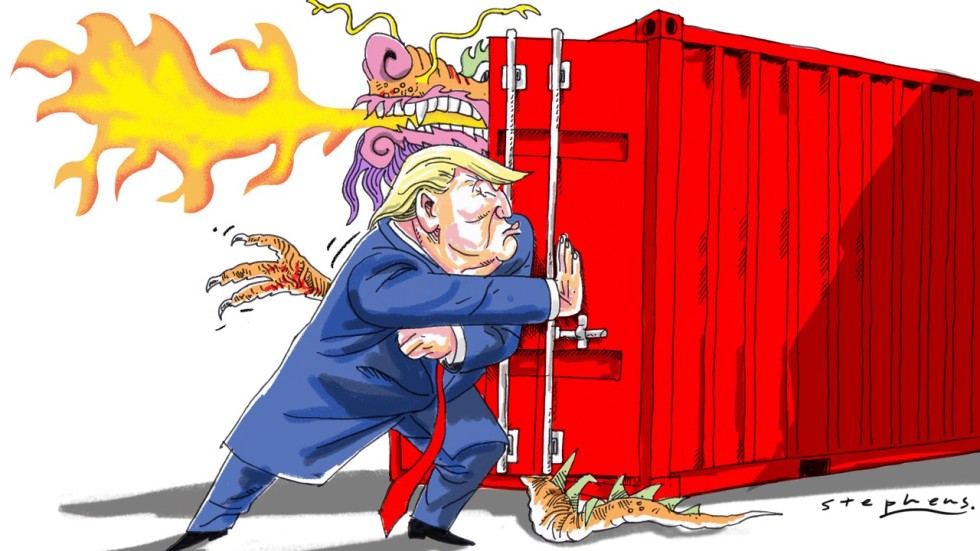I think trump is not going to get his "manage trade" with China So what is he gong to do assuming he survive the mid nov election ?Using Taiwan as a bargaining chip That would be a slippery path down to the abyss. I hope it won't come to that
US cold war containment strategy against China may not end the Soviet way. Instead, it could explode into armed conflict
Will Saetren says China’s economic strength, coupled with its military might, make the US’ containment strategy much more dangerous this time around
PUBLISHED : Monday, 17 September, 2018, 2:01am
UPDATED : Monday, 17 September, 2018, 2:01am
16 Sep 2018
For months, the United States and China have been exchanging blows over trade. What began with the Trump administration imposing tariffs on a
earlier this year has ballooned into a list that includes thousands of items. In July, Trump announced that he is prepared to impose tariffs on all
of imports from China.
The showdown between the world’s two economic powerhouses has shaken the global financial system to its core. Over the summer, the World Bank warned that the
could trigger a drop in global trade of as much as 9 per cent, the type of economic shock the world hasn’t seen since the
.
But, in recent weeks, China has begun to suspect that the trade war is about more than just economics. Chinese officials and academics have indicated that they see the trade war as a piece of a bigger puzzle, a grand strategy reminiscent of the
intended to thwart China’s rise.
This is a dangerous development that has profound implications for strategic stability.
Containment was designed shortly after the second world war as a means of curbing Soviet expansionism. At its core, containment sought to confront the Union of Soviet Socialist Republics (USSR) through back door channels, support for anti-communist forces, and all other means short of direct, armed confrontation.
The driving philosophy behind the policy was that the Soviet system was rotten at its core and would eventually collapse on its own
The driving philosophy behind the policy was that the Soviet system was rotten at its core and would eventually collapse on its own. Sure enough, in 1989, the Berlin Wall came tumbling down and, by 1991, the Soviet Union had fully dissolved.
Although containment worked in this case, it is a policy that entails great risk. An adversary who feels backed into a corner is prone to lash out and take greater risks to achieve limited gains and avoid losing face. This was the case with the Soviet Union, which found itself locked in an ideological struggle with a technologically superior foe.
During the Cuban missile crisis, Nikita Khrushchev tried to rectify this imbalance by stationing nuclear missiles capable of striking the US on Cuba. But Khrushchev overplayed his hand. The US detected the transfer before it was complete and the confrontation nearly escalated into a full-blown nuclear war. Although the cold war ended peacefully, we are lucky to have got out of it alive.
China, however, is no Soviet Union. Since opening up to the outside world 40 years ago, China has developed into a vibrant economic behemoth. China’s gross domestic product in purchasing power parity terms is much larger than the US’ and it is poised to become the
.
China is likely to dethrone the US as the world’s largest economy as measured by GDP. In short, it is highly unlikely that the Chinese system will fade into obscurity
China’s economy is growing at twice the rate of the global economy, and by 2028, is likely to dethrone the US as the world’s largest economy as measured by GDP. In short, it is highly unlikely that the Chinese system will fade into obscurity.
Yet this is the path the Trump administration has chosen. In January, the US labelled China a strategic competitor in its
. Recent US moves to
to Taiwan have only made matters worse.
Just last month, the Trump administration
making it harder for Chinese companies to acquire high-end technology. Shi Yinhong, a foreign affairs adviser to China’s State Council, called the move “hi-tech containment”.
People’s Daily accused the US of seeking global hegemony, and proclaimed that China should be determined to fight.
Watch: Are Chinese consumers less willing to buy American goods?
And fight they might. China has developed a powerful regional military that is likely to win any fight it picks in its own backyard, particularly in the
. Chinese and US military forces already spar regularly in the region as the US asserts its
rights in waters claimed by China.
By implementing a policy of containment towards China and labelling it as a de facto enemy, the Trump administration is pouring fuel on the fire, increasing tensions, and with it, the likelihood that one of these confrontations could escalate out of control.
Consider the following hypothetical scenario: a US destroyer is harassed by Chinese coastguard vessels during a freedom of navigation patrol. Unable to change course, the US warship rams one of the Chinese vessels, killing dozens of sailors. To China, this an act of aggression in its territorial waters, and they call for reinforcements to apprehend the destroyer’s crew. From a US perspective, this was an accident that took place in international waters.
The crew refuses to surrender. With tensions soaring the chain of command breaks down. Someone panics and shoots. The ensuing fight escalates into a full-blown naval battle with multiple Chinese ships sunk as well as a US$3 billion US destroyer with all hands. Through a series of unfortunate events, two nuclear armed superpowers find themselves in an armed conflict that nobody wants.
War between the US and China would be an unmitigated disaster for both parties. Both countries depend on each other to thrive, but that doesn’t mean that war couldn’t happen. History has taught us that when national pride is involved and one party (or both) feels trapped in a corner, simmering tensions can erupt into a roaring blaze. We can only hope that someone in the Trump administration was paying attention during that lesson.
Will Saetren is a research associate at the Institute for China-America Studies, where he specialises in nuclear weapons policy

